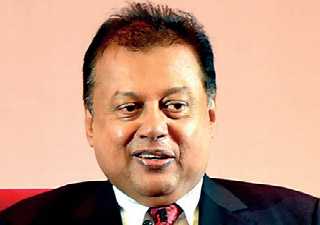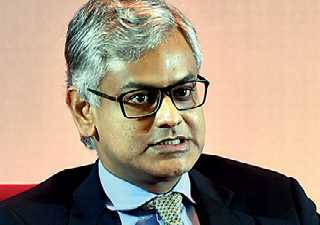Friday Feb 27, 2026
Friday Feb 27, 2026
Tuesday, 24 November 2020 01:19 - - {{hitsCtrl.values.hits}}

99X Technology CEO Mano Sekaram

Access Engineering Chairman Sumal Perera

John Keells Holdings Chairman Krishan Balendra
By Uditha Jayasinghe
The dual policy proposals to increase the private sector retirement age to 60 and imposing a 0.25% levy on turnover of companies belonging to selected sectors to set up a COVID-19 insurance fund could have regressive impact on the labour sector, top industry officials warned recently. Several participants of the Daily FT-Colombo University MBA Alumni Association organised Budget 2021 Forum including Access Engineering PLC Chairman Sumal Perera, Hemas Holdings PLC Group CEO Kasturi Wilson and 99X Technology CEO Mano Sekaram were of the view that imposing a retirement age was unnecessary as most companies would keep workers past the standard retirement age of 55.
They also pointed out setting a higher retirement age would reduce space for companies to balance and manage their staff as best suited them.
“It is disappointing that Budget 2021 did not focus more on the opportunity to implement labour reform in the post-COVID environment. When a pandemic hits the first reaction is to freeze recruitment. However, in our industry because there are so graduates coming out, we have decided to take temporary graduates and asked for the law to be amended for this period but that was not forthcoming. It is important to have labour rights but it is also important to see how we can create employment during a crisis. If graduates stay at home they will stagnate, so we have to open it out and have more flexibility over the next two years. For most companies it might be a good strategy to expand their employees to deliver better services,” Sekaram opined.
His view was echoed by Perera who emphasised that a retirement age should not be compulsory and pointed out most companies would work to retain their most productive staff. He went on to say companies should be given the flexibility to incentivise productivity to bring out the best in their employees and keep them motivated.
“The focus should be on how to create more jobs so that those entering the workforce can have fresh opportunities, rather than how long people work,” he added.
The panel, which also included Hayleys PLC Co-Chairman Dhammika Perera, John Keells Holdings PLC (JKH) Chairman Krishan Balendra, Expolanka Holdings PLC Group CEO Hanif Yusoof, Standard Chartered Bank Sri Lanka CEO Bingumal Thewarathanthri, PricewaterhouseCoopers (PwC) Director Charmaine Tillekeratne and SC Securities Ltd. Head of Research Charitha Gunasekere, warned that the Government may have also taken a wrong turn in imposing a new tax to fund a COVID-19 insurance scheme.
The panellists argued that companies have already made considerable efforts to attempt retaining as many staff as possible and may step back from such measures if they are also forced to pay an additional tax. The Government is expected to funnel earnings from the new levy into a separate fund to set up an insurance scheme to support people who lost employment due to the pandemic.
Hemas Group CEO Kasturi Wilson pointed this was a dual edged policy because it disincentivised companies from focusing on retaining staff as they would have to spend more on keeping employees as well as paying the new tax. JKH Chairman Krishan Balendra also pointed out that while some companies had had to reduce staff in some subsidiaries they were hiring additional staff in others and the levy could be unfairly applied in such instances.
“Take us for example, our tourism business is doing badly so there are staff reductions on that front but we are also hiring more staff into other segments such as supermarkets to widen services. So the new proposal will have to be sensitive to complex situations created by COVID-19.”